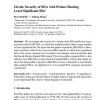Free Online Productivity Tools
i2Speak
i2Symbol
i2OCR
iTex2Img
iWeb2Print
iWeb2Shot
i2Type
iPdf2Split
iPdf2Merge
i2Bopomofo
i2Arabic
i2Style
i2Image
i2PDF
iLatex2Rtf
Sci2ools
AAECC
2004
Springer
2004
Springer
On the Security of RSA with Primes Sharing Least-Significant Bits
Abstract. We investigate the security of a variant of the RSA public-key cryptosystem called LSBS-RSA, in which the modulus primes share a large number of least-significant bits.We show that low public-exponent LSBS-RSA is inherently resistant to Partial Key Exposure (PKE) attacks in which least-significant bits of the secret exponent are revealed to the attacker, and in particular that the Boneh-Durfee-Frankel PKE attack [5] on low public-exponent RSA is less effective for LSBS-RSA systems than for standard RSA. On the other hand, we show that large public-exponent LSBS-RSA is more vulnerable to such attacks than standard RSA. An application to server-aided RSA signature generation is proposed.
| Added | 15 Dec 2010 |
| Updated | 15 Dec 2010 |
| Type | Journal |
| Year | 2004 |
| Where | AAECC |
| Authors | Ron Steinfeld, Yuliang Zheng |
Comments (0)

